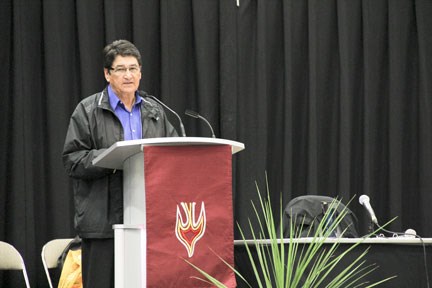It was a meeting of the spiritual minds when dignitaries within the United Church of Canada visited the Energy City over the weekend.
Estevan hosted the Saskatchewan Conference of the United Church of Canada's annual meeting over the weekend, with events filling Spectra Place from May 30 to June 2. Estevan's Don Kindopp was the local organizer and called it an affirming conference, meaning it was accepting of all colours, sexual orientations, marital statuses and anyone else who wished to participate.
The conference included the retirement and ordination of ministers in the province.
Ovide Mercredi, a lawyer and First Nations advocate, was the theme speaker at the event, presenting a two-part address to the conference on Friday and Saturday. The address was given on "Gathering Spirits, Building Relationships."
His speech was part history lesson, as he spoke about the damage that had been done to his ancestors' spiritual beliefs.
He noted his people were converted to Christianity when he was a young boy.
"There was no reflection, not even an inkling of the peace pipe, the sweat lodge, the shake tent or the circle," said Mercredi. "They had completely disappeared by the time I was born."
He said the role of spirituality is in uplifting people.
As a child, he attended the Catholic Church, though his mother was an Anglican. He recalled that in that time, those two institutions were divided, with each side suggesting their church would be more preferable to Jesus.
He said, however, that at that time lots of people went to church and were very devout. The churches were filled with standing room only. On holidays such as Christmas, he said people would attend multiple times a day, "filling the churches with prayer."
As many others have noted before, those numbers have diminished dramatically.
"What is there to replace it? What replaces that spiritual component that sustains life?" asked Mercredi, who noted that is happening for a number of reasons.
He is one of those who left the church.
"I had an appreciation that my own people had their spirituality," he said, regarding his decision to return to those roots.
To find those beliefs, he went to an elder woman to ask about his ancestors' spirituality.
"Her response bewildered me. I couldn't understand what it was, or why it was like that. She said, 'That's the way we were before. We're not like that anymore.'"
As he got older and had more experience around the country, he saw just how big of an impact Canadian society had on his people.
"When the missionaries came west, they tried to convert First Nations people to Christianity and were not that successful. They were not successful because the First Nations people had their own spiritual beliefs, their beliefs were strong and powerful, and they had no reason to change," said Mercredi. "So, the Christians lobbied Parliament. They went to the politicians in the House of Commons and they sought a law to forbid First Nations people from maintaining their spiritual beliefs, customs, traditions and ceremonies. This is an instance of religious bigotry in this country."
A law was passed in 1881, remaining on the books until 1926, but he noted it was practised until 1960. The law characterized Indian spirituality as "the worship of the devil and the heathen's way of belief."
There was an idea at the time, he said, that Christianity was right, and everyone else was wrong.
"I couldn't imagine how an entire race of people, like the Chinese people, could not be in heaven because they were not Christian," said Mercredi, about struggles with his faith years ago. "I thought if that's the case, I don't want that god, who discriminates against humanity."
The elder he wished to speak to about Cree beliefs he said was born in the 1880s and would have been indoctrinated by the church and the government to abandon her ancestors' customs. He called that the "impact of colonization."
He said reconciliation is about more than simply land and trees.
"How do we understand each other, and how do we begin to accept the different paths to the creator's road?" said Mercredi, noting reconciliation involves spirituality as much as it does anything else.
He said Cree people were encouraged to become Christians because it was easier.
"I know both ways, and they're both easy because it's about belief. It's not about the physical church or the mental exercises. It's about the heart and how you feel," said Mercredi.
In some ways, Canada has made great strides when it comes to its relationship with First Nations people, but Mercredi said it will take open minds from everyone if current issues are expected to be solved.
"People will not hear each other unless they open their hearts and their minds. The people will not reach a compromise or a consensus unless they find a common vision for what's good for this country and what is good for First Nations," he said. "What we need to do is find a path, a common path we can build together, so that the end result is a country that is better than it is now and First Nations know prosperity, not poverty."




